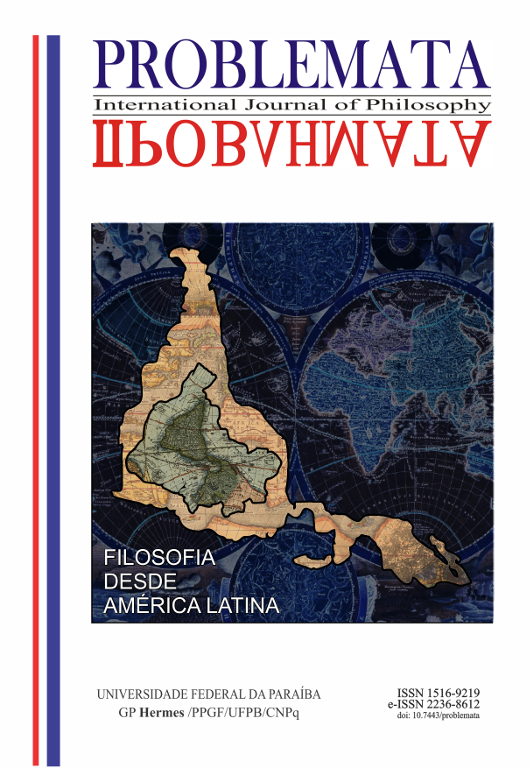AUTENTICIDADE DA EMANCIPAÇÃO ENTRE HEIDEGGER E RODOLFO KUSCH
DOI:
https://doi.org/10.7443/24249Keywords:
Autenticidade, Emancipação, Rodolfo Kusch, Heidegger, Ser - Estar.Abstract
O projeto emancipatório latino-americano é carregado de uma eticidade intrínseca. Na busca por compreender tal fenômeno, optamos pela comparação do conceito de autenticidade de Heidegger e do pensador argentino Rodolfo Kusch. Para tanto, este texto apresenta primeiramente algumas explicações sobre o sentido de autenticidade em cada um dos dois filósofos; estando evidentes suas divergências conceituais, tornamos também evidente a incompatibilidade da autenticidade heideggeriana com a emancipação latino-americana, mas também as dificuldades da autenticidade kuscheana para não cair novamente numa ontologia do ser. Por fim, apresentamos uma breve proposta de solução a tal impasse baseada na assimilação antropofágica dos pensamentos de ambos filósofos.
[doi:http://dx.doi.org/10.7443/problemata.v6i1.24249]
Downloads
References
HEIDEGGER Martin. Ser e Tempo. Editora Vozes, Petrópolis, 2009.
KUSCH Rodolfo. América profunda. Editorial Bonum, Buenos Aires, 1986.
______. Geocultura del hombre americano. Fernando García Cambeiro, Buenos Aires, 1976.
Downloads
Published
Issue
Section
License
Authors who publish with this journal agree to the following terms:
- Authors retain copyright and grant the journal right of first publication with the work simultaneously licensed under a Creative Commons Attribution License that allows others to share the work with an acknowledgement of the work's authorship and initial publication in this journal.
- Authors are able to enter into separate, additional contractual arrangements for the non-exclusive distribution of the journal's published version of the work (e.g., post it to an institutional repository or publish it in a book), with an acknowledgement of its initial publication in this journal.
-
- Authors are permitted and encouraged to post their work online (e.g., in institutional repositories or on their website) prior to and during the submission process, as it can lead to productive exchanges, as well as earlier and greater citation of published work (See The Effect of Open Access).





